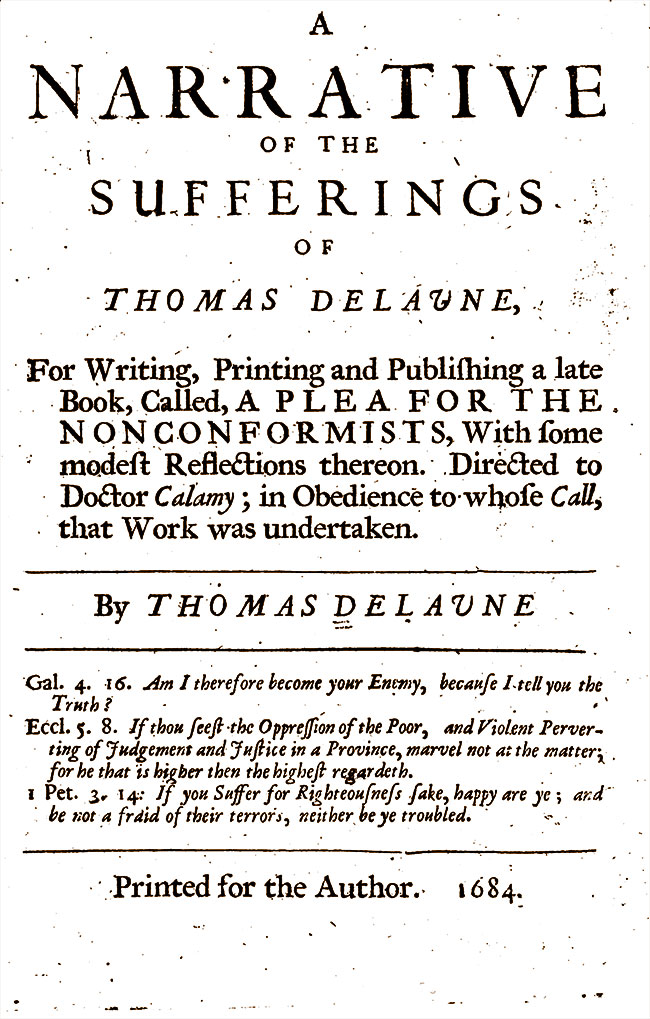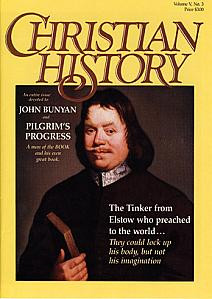FOR DARING TO DISSENT, DELAUNE STARVED TO DEATH

[Above: Title page of A Narrative of the Sufferings of Thomas DeLaune, 1684.]
IN 1683, Dr. Benjamin Calamy preached a sermon, “which he afterward published under the title of A Discourse about a Scrupulous Conscience, of which we may truly say, that never any piece of it’s kind or size, gained more credit to it’s author, or was more taken notice of by the publick,” wrote Andrew Kippis in his Biographia Britannica. “This sermon he preached a second time at Bow Church with great effect, and this excited a zealous Nonconformist, one Mr Thomas De Laune, who had been formerly a schoolmaster, to write against it . . . .”
De Laune titled his reply A Plea for the Nonconformists in a Letter to Dr. Benjamin Calamy, Upon His Sermon Called "Scrupulous Conscience." Calamy had appealed to reason, noted De Laune, and so, after months examining the positions of both nonconformists and Church of England theologians, he gave reasons why nonconformists (also known as dissenters) objected to certain practices of the established church.
He observed that when imposing religious practices, kings and prelates said they could do so because they were matters of “indifference” that is, neither commanded by nor forbidden by Scripture. However, when dissenters rejected these matters of “indifference,” they could expect severe treatment, showing that these practices were not so indifferent after all.
As a matter of fact, those objecting to Church of England practices could be met with imprisonment, confiscation of property, and even death. The government's rationale was that to oppose a practice ordered by the king was sedition and to write against a practice imposed by royal authority was libel.
As could be expected, when De Laune published his reply, he was arrested and charged with libel. On this day, 29 November 1683, he was thrown into a crowded space with rough, common prisoners. He suffered greatly. When his case was heard, the judge fined him one hundred marks, or seventy-five pounds (USD $20,000 in 2020). Not having that kind of money, he was sent to Newgate Prison where he was imprisoned with felons. Later he was moved to a more respectable part of the prison. Prisons then fed their charges only if they paid. With no way to earn an income, De Laune was dependent on the gifts of visitors.
In this desperate situation, De Laune appealed to Dr. Calamy for help. He had written his Plea for the Nonconformists in response to Calamy’s call for reason, he said. Now he recounted his sufferings and pointed out the inequity of their positions in any argument. “Sir you know that 'tis unequal to gag the Respondent, when the opponent’s mouth is at liberty nor to manacle the assaulted, when the challenger flourishes a menacing sword.” Calamy, who did not consider himself in any way responsible for De Laune’s situation, made no effort to extricate him from prison.
De Laune’s situation rapidly deteriorated. His wife and two children came to live with him in debtor’s prison. Starving and sickened by the foul air, they died. De Laune had borne his sufferings pretty well to this point, but now lost heart. A few months later, in 1685 he, too, died, having been imprisoned fifteen months.
The Baptists used De Laune’s Plea to support their dissenting position and it went through several editions. Daniel Defoe, the famous author of Robinson Crusoe, wrote the preface to the 1706 edition. As Defoe had also suffered for his religious convictions and for indebtedness, De Laune’s story stuck a sympathetic chord in him.
The treatment the reverend and learned author of this book met with, will forever stand as a monument to the cruelty of those times,” he wrote. But Defoe pointed out that De Laune was only one of about 8,000 dissenters who perished in prison or on the scaffold during the reign of King Charles II. “I cannot refrain saying, such a champion of such a cause deserved better usage, and it was very, very hard such a man, such a Christian, such a scholar, and on such an occasion, should starve in a dungeon, and the whole body of dissenters in England, whose cause he died for defending, should not raise him 66£, 13s 4p to save his life.
—Dan Graves
----- ----- -----
DeLaune was a contemporary of John Bunyan, who also suffered imprisonment as a nonconformist. To understand that era better, watch John Bunyan: Journey Of A Pilgrim at RedeemTV
(John Bunyan: The Journey of a Pilgrim can be purchased at Vision Video)
or read Christian History #11, John Bunyan and "Pilgrim's Progress"
--------
Contemplate the story of the Incarnation day-by-day throughout the season of Advent in our latest publication, The Grand Miracle. Based on the writings of C. S. Lewis, J.R.R. Tolkien, George MacDonald, Dorothy Sayers, and others, each day’s reading offers a fresh look at the birth of Christ through the eyes of a modern author. Scripture, prayer, and full-page contemplative images complete each entry. 28 days, 64 pages. Preview the Devotional here.









